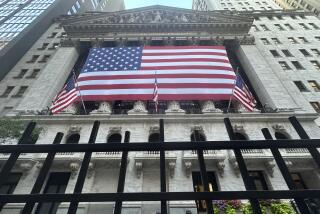S&P 500 edges closer to bear market territory
In the battle for stock investorsâ minds, if not their hearts, the bears are winning.
Another dive in share prices worldwide pushed the broad Standard & Poorâs 500 stock index close to a 20% drop from its spring peak, raising fears of a fresh cascade of selling by investors who donât want to risk deeper losses.
âThereâs a void of confidence right nowâ in global markets, said Bill Larkin, a bond manager at Cabot Money Management in Salem, Mass.
That was the story of the third quarter, and it dominated market action on the first trading day of the fourth quarter: Nervous investors kicked off the final three months of the year by dumping stocks and fleeing once again for the classic haven of U.S. Treasury bonds, as fears over the global economy resurged.
The Dow Jones industrials Monday slumped 258.08 points, or 2.4%, to 10,655.30, the lowest close since September 2010, after falling 12% in the third quarter.
Despite data Monday showing an uptick in U.S. manufacturing activity in September and strong car sales for the month, those reports were good only for a modest rally at the beginning of trading, before sellers took control.
âEverything has a negative bias now,â said Andy Brooks, a veteran stock trader at T. Rowe Price in Baltimore. âWhereâs the glass-half-full crowd?â
The optimistsâ ranks have shrunk for the last two months as Europeâs government-debt crisis threatened to fuel a new global financial meltdown, just three years after the U.S. banking system nearly collapsed from mortgage losses.
Stocks had fallen in most Asian markets Monday, and the trend continued in Europe after Greece said it wouldnât meet targets for reducing its budget deficit in 2011 or 2012, despite a vicious austerity campaign to cut spending.
That raised once again the prospect of a Greek bond default, even though many analysts believe the rest of the Eurozone will pony up money Greece needs this month to avoid default.
Battered European stock markets were mostly down 1% to 2.3% for the day, after rebounding last week. The euro fell 1.6% to an eight-month low of $1.318.
Although Europeâs woes have held the spotlight all year, investors lately have become fearful that Chinaâs economy could slow more than expected, dealing another hit to global growth. A gauge of Chinese manufacturing activity improved slightly in September, but the Shanghai composite stock index fell to a 2 1/2 -year low Monday.
On Wall Street, worries about the U.S. economy were fanned by a plunge in airline stocks on talk that American Airlines parent AMR Corp. may seek bankruptcy protection. AMR sank 33% to $1.98.
The turn of the calendar to October also has contributed to investorsâ dismal mood, analysts say.
October has a reputation as a calamitous month for stocks, mainly because two of the biggest crashes in history occurred this month, in 1929 and 1987.
But October also is known as the âbear killerâ because it marked the bottom for 11 bear markets since World War II, including those of 1973-74 and 2000-02, according to the Stock Traderâs Almanac. Market bulls say history may repeat again, with stocks already down sharply.
Even if investors believe that the current market decline will end this month, the question is how much deeper the losses will get before the selling wave exhausts itself.
With Mondayâs 2.8% drop in the S&P 500, to 1,099.23, the index closed below the 1,120 mark, which is where it had bounced three times since early August. Whatâs more, the S&P now is down 19.4% from its spring high. A drop of 20% is the usual threshold for declaring a new bear market.
Indexes of U.S. small- and mid-size stocks already are well into bear markets. But if the blue-chip S&P 500 enters bear territory it could be a bigger blow to investor psychology because the S&P is a benchmark for many 401(k) retirement accounts.
Sam Stovall, chief investment strategist at S&P in New York, said he worries that small investors could flood the exits, fearing that a 20% drop in the S&P 500 could soon turn into a 50% drop, as occurred in 2008-09.
âBecause people remember 2008, they may take the attitude of âsell now and ask questions later,ââ Stovall said.
More to Read
Inside the business of entertainment
The Wide Shot brings you news, analysis and insights on everything from streaming wars to production â and what it all means for the future.
You may occasionally receive promotional content from the Los Angeles Times.









